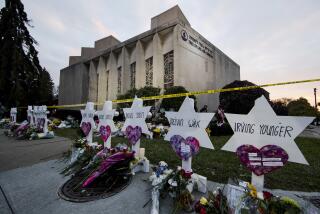Pipe Bomb Suspect Talked of Ideal Crime, Friend Says
- Share via
ST. PAUL — The man accused of sending pipe bombs that killed a federal judge and a civil rights lawyer once talked of committing the perfect crime, his former girlfriend testified Friday.
“He said you build a bomb--then when everything exploded there’d be nothing left to investigate,” Carlene Shiver said.
Shiver testified in the trial of Walter Leroy Moody Jr., the 57-year-old Georgia man who is on trial for mailing four pipe bombs in December, 1989, two of which exploded, killing the recipients.
In other testimony, a friend of Moody’s who claimed he unwittingly helped make three pipe bombs said that he recognized his creation when he saw an X-ray of one of the unexploded bombs on television.
“I said: ‘Oh, my God, what’s happened here,’ ” said Ted Banks, who was described by defense attorneys as a “career con man” who met Moody in prison in the early 1970s.
Banks said he cut three 6-inch pieces of pipe for Moody in 1989 and then welded steel plates on the ends. He said he declined to furnish Moody with gunpowder, however, because “I thought he was making a bomb, and I didn’t want to be involved.”
Banks, who testified that he had been involved with Moody for years in assorted insurance and bank fraud schemes, said his friend assured him repeatedly that he was not making bombs.
Despite the assurances, Banks said: “I just had a bad feeling.”
Banks, who is in federal custody after pleading guilty to charges of possessing illegal weapons and lying to federal agents, testified as part of a plea agreement.
The picture of Moody that emerged in testimony Friday was of a fiercely bigoted but brilliant con man, an amoral conniver of above-average intelligence and confidence who never tired of concocting intricate schemes designed to make money and punish people.
Among the schemes Banks said he participated in was one in which Moody sued a bank for $11 million, falsely claiming that the bank had caused him to lose money on contracts by refusing to allow him ready access to his funds. To back up their claims, Moody and Banks wrote bogus backdated contracts.
Also, Shiver testified that when she dated Moody his income came from two fraudulent mail-order businesses. After they broke up, she said, he sued her unsuccessfully, alleging that she had stolen $2,600 from him and claiming that they had never had a romantic relationship.
Shiver, who said she dated Moody in 1980 and 1981, said he blamed the judicial system for “the downfall of the country and the white man” and made numerous racist statements about black people. She also said he disliked Jews, whom he accused of dominating the legal system.
“He told me that the NAACP was backed by the Jews . . . that the blacks were just a front to get what they wanted,” Shiver said, adding that he contended that blacks “should be rounded up and put on a boat and sent back to Africa.”
She added that Moody made jokes about the series of murders of black children that focused attention on Atlanta in the early 1980s and that he considered George C. Wallace, the former segregationist governor of Alabama, a hero.
Prosecutors contend that Moody was so obsessed with overturning a 1972 conviction for possessing a pipe bomb that he declared war on the judiciary when a panel of federal judges denied his appeal in 1989.
Letters that took credit for the bombings and that threatened to assassinate 17 judges were signed “Americans for a Competent Federal Judicial System.” One long letter sent to an Atlanta television station criticized the judicial system as being too lenient on blacks.
Prosecutors played a tape of an Atlanta television news broadcast in which a white supremacist leader had expressed views similar to those in the letter. Asst. U.S. Atty. Howard M. Shapiro said he wanted to show that the letter, which had been mailed the same evening, may have been inspired by the broadcast.
Shapiro argued in opening statements on Tuesday that Moody invented the fictitious organization and created a purely racial motive for the attacks to lead investigators astray.
Edward D. Tolley, Moody’s attorney, appeared to attempt to shift blame for the bombings to Banks, pointing out in questioning that Banks had a schematic drawing of a bomb in his possession when he was arrested last November and also had newspaper clippings about the assassination of Dr. Martin Luther King Jr.
Tolley has contended that testimony against Moody is all coming from disgruntled girlfriends and people, such as Banks, who, he said, are lying to save themselves.
More to Read
Sign up for Essential California
The most important California stories and recommendations in your inbox every morning.
You may occasionally receive promotional content from the Los Angeles Times.












